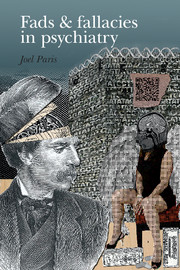8 - Psychotherapy
from Part II - Effects
Published online by Cambridge University Press: 01 January 2018
Summary
I was trained at a time when psychotherapy, particularly psychodynamic therapy, was a central focus for psychiatry in the USA. Today, these methods play a more marginal role in practice, and CBT, now the favoured approach, is usually farmed out to other professionals. Talking therapy requires expensive human resources. Although psychiatrists report carrying out psychotherapy in practice (Mojtabai ' Olfson, 2008), these are not necessarily formal or systematic interventions.
This field has also suffered from its share of fads and fallacies. Psychotherapy is an evidence-based treatment; however, it is not always effective and can sometimes be harmful (Paris, 2013a). Ironically, psychiatrists receive more consistent training in psychotherapy than psychologists and social workers (Weissman et al, 2006), who provide most of the services.
From the creation of psychotherapy in the late 19th century, many professionals have been puzzled about how ‘just talking’ helps people with mental disorders. Patients often ask the same question. Yet in common mental disorders, talking therapies give drugs a run for their money. In a landmark meta-analysis, Smith and colleagues (1980, p. 10) concluded: ‘psychotherapy benefits people of all ages as reliably as school educates them, medicine cures them, or business turns a profit’. But of course medicine does not always cure, business does not necessarily make a profit, and psychotherapy does not always work. Even so, talking therapies work often enough to be an important option, particularly when pharmacological interventions are not particularly effective.
Still, there are serious problems with the current practice of psychotherapy. Goals are often unclear and treatment often goes on for too long, sometimes interminably. I was taught to see patients once or twice a week for several years, and practised in that way for some time. Eventually, I realised this kind of treatment is neither effective nor cost-effective. It can go on forever, in endless circles of ‘cyclotherapy’. At one point, I took a sabbatical from practising therapy and concentrated on reading the research literature. I learned that most of what I had been taught was wrong.
- Type
- Chapter
- Information
- Fads and Fallacies in Psychiatry , pp. 79 - 87Publisher: Royal College of PsychiatristsPrint publication year: 2013



